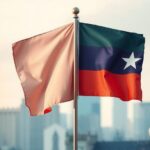Argentina to Declassify Documents on Post-War Nazi Refugees
The Argentine government will declassify documents regarding Nazis who fled to Argentina after World War II, as per President Javier Millay’s decree. The decision was influenced by discussions with U.S. Senator Stephen Daines, advocating for the disclosure of this information. Many Nazi criminals sought refuge in Argentina, aided by false documentation and the country’s lack of extradition treaties.
The Argentine government, under the leadership of President Javier Millay, has announced plans to declassify documents pertaining to Nazis who sought refuge in Argentina following World War II. This directive, confirmed by the Argentine newspaper Infobae, aims to ensure transparency regarding the historical context of Nazi presence in the country. President Millay emphasized the necessity of public knowledge by stating, “there is no reason to hide” the information.
Prior to this initiative, President Millay engaged in discussions with United States Republican Senator Stephen Daines, who has been advocating for the disclosure of records linked to Nazi fugitives. This meeting highlights the international concern surrounding the historical implications of such refuge.
In the aftermath of World War II, numerous Nazi criminals relocated to Argentina, as the government at the time had affiliations with fascist regimes and sought to leverage German expertise for national development. The provision of false documentation facilitated their entry, while the absence of extradition treaties with various nations further enabled this phenomenon.
The Argentine government’s decision to declassify documents on Nazis who fled to Argentina post-World War II represents a significant step towards transparency and accountability. With the emphasis on public access to these records, President Millay’s administration acknowledges the importance of understanding this convoluted historical aspect. Furthermore, the government’s past collaboration with fascist elements underscores the complexities of post-war immigration policies in South America.
Original Source: babel.ua








Post Comment